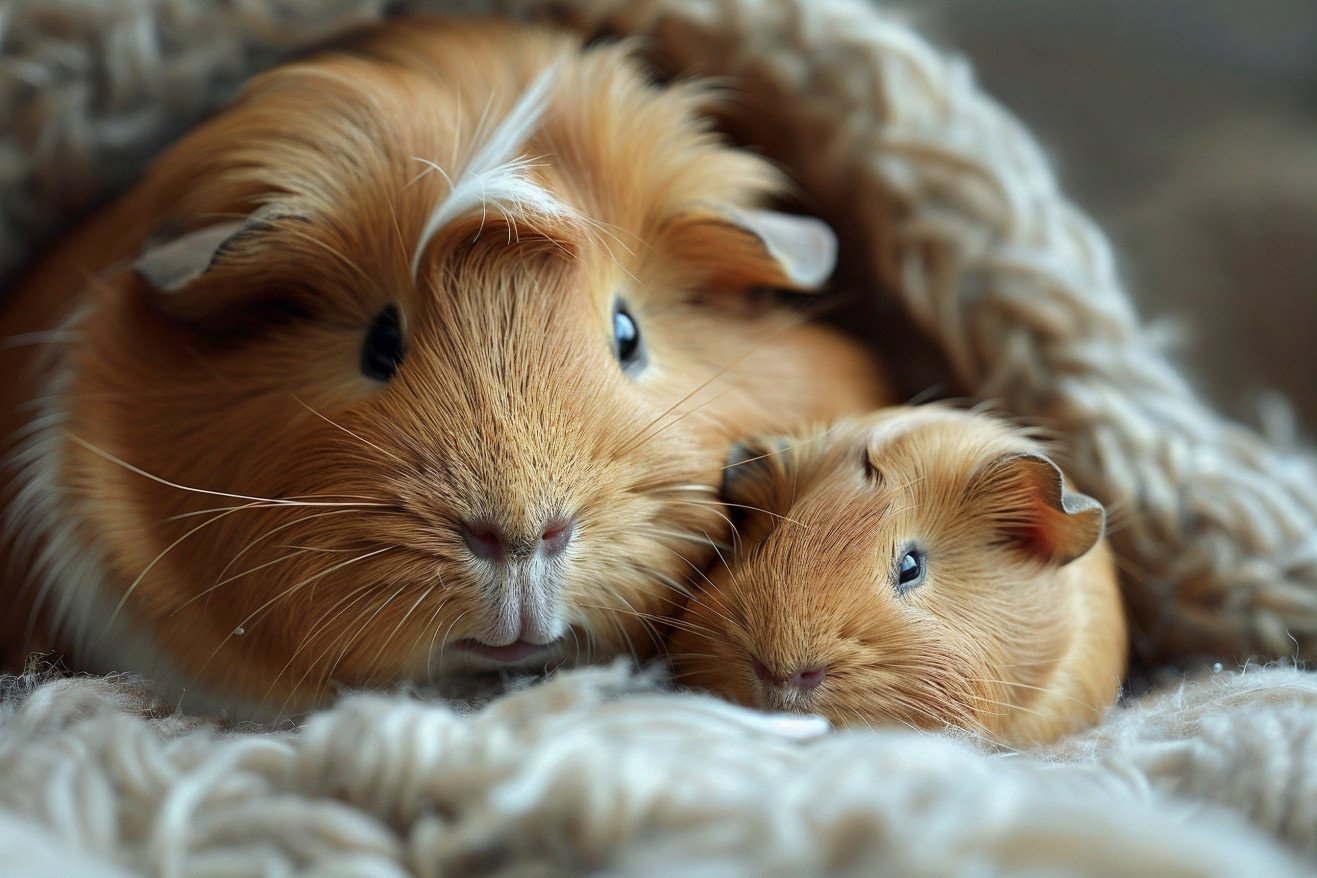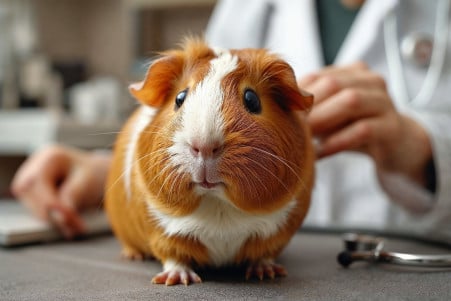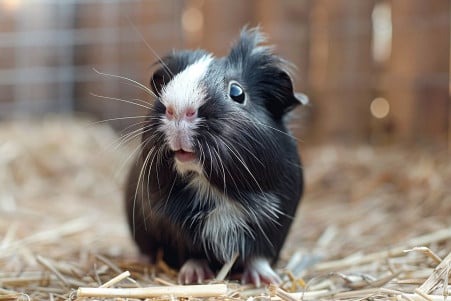Exploring Guinea Pig Offspring: How Many Babies in Each Litter?
15 April 2024 • Updated 15 April 2024

If you're thinking about getting a guinea pig, it's important to know about their breeding habits and how many babies they typically have at a time. Guinea pigs are known to be highly fertile animals, and when bred, sows (females) can have litters of 2-6 pups every 2-3 months, so it's important to know how to prevent unwanted pregnancies unless you're planning to breed them.
To help answer this question, we'll look at research and expert knowledge on the guinea pig's reproductive cycle, average litter size, and other factors that can affect how many babies they have. This information can help potential owners better understand the housing, population, and care needs of their cavies.
How Many Babies Do Guinea Pigs Have Per Litter?
Breeding and Estrous Cycles of Guinea Pigs
Female guinea pigs are able to reproduce at a very young age, with some sources stating that they can start as early as 4 weeks old and males as early as 3 weeks old. Sows are able to breed year-round and have an estrous cycle that lasts for 16 days with a fertility period of 6-11 hours that occurs primarily at night.
Even though guinea pigs are able to breed at a young age, the window for breeding is still relatively small. Towcester Vets suggests that sows are bred between 6-12 months of age, while boars can be bred as early as 6 months to avoid potential complications from the sow being too young or too old. Sows can have up to 5 litters a year, but typically have 3 due to the 16-day estrous cycle.
Most importantly, sows go into postpartum estrus within 15 days of giving birth according to The Spruce Pets. This means that it is important to separate males and females after breeding, as the sow can become pregnant again very quickly, which can be hard on her body. By monitoring the estrous cycle and separating the males and females, unwanted and frequent pregnancies can be avoided.
What Determines Litter Size in Guinea Pigs?
Sow age is one of the most important factors that determines litter size, with younger and older sows having smaller litters. The Merck Veterinary Manual states that very young and old sows have smaller litters than sows in the optimal breeding age of 6-12 months.
Sow obesity and malnutrition can also lead to smaller litters and other pregnancy issues. The RSPCA explains that "fertility and litter size are lower in obese sows" and that "poor nutrition reduces fertility, litter size, and survivability of the pups."
First-time litters, especially in older sows, are more likely to experience dystocia and smaller litters. Guinea Pigs Australia notes that "there is an increased risk of dystocia with single pup litters, first time litters, and particularly first time litters if the sow is over 1 year old."
While genetics and breed may also impact litter size, this area requires further study. That said, the most important thing to remember is that the sow's age, body condition, and nutrition need to be managed and maintained to ensure optimal litter sizes and pregnancy success.
Guinea Pig Pregnancy Symptoms
Knowing the symptoms of pregnancy in guinea pigs is important so that you can make sure that you are providing the right care and attention. Some of the early symptoms include increased appetite and a preference for vitamin C-rich foods, according to Small Pet Select. Later on, you will start to notice that your guinea pig is gaining weight and has a larger belly.
Changes in behavior can also be a sign of pregnancy, such as being more lethargic and sleeping more, according to Omlet. Pregnancy can be confirmed by a vet through an ultrasound, X-ray, or by palpating the fetuses, according to Home & Roost.
It's important to keep a close eye on your pregnant guinea pig because they are at risk for pregnancy complications like toxemia and dystocia (difficult birth), according to Home & Roost. You should consult a vet to make sure that your sow and her babies are healthy and safe.
How to Take Care of Pregnant Guinea Pigs and Their Babies
Pregnant guinea pigs have slightly higher nutritional needs than non-pregnant sows. As noted by The Guinea Pig Vet, this includes more calcium and protein to ensure the fetus develops properly. It's also important to make sure the sow has a safe, low-stress environment in which to give birth. According to the New Plymouth Vet Group, this can be accomplished by providing a nesting box or area filled with soft bedding.
Guinea pig babies are born relatively well-developed, weighing between 50-100 grams according to The Guinea Pig Vet, and are able to walk and eat solid food within a couple of days. That said, they should still be nursing from their mother and will be weaned at 3-4 weeks old or when they reach 250 grams, as recommended by the New Plymouth Vet Group. To prevent inbreeding, male babies should be separated from their mother and sisters by the time they are 6 weeks old, according to Coops and Cages.
Ethical Breeding of Guinea Pigs
Guinea pigs should only be bred with intention and with the proper knowledge and resources to care for the babies. The RSPCA states that sows should be bred for the first time when they are big enough to carry a litter, which is usually between 5-13 weeks old and 350-500g in weight. However, Bishops Stortford Vets warns that females should be bred for the first time between 3 and 7 months to avoid serious, sometimes life-threatening, birthing complications.
Breeding sows that are too young (under 6 months) or too old (over 12 months) can lead to complications, as pointed out by Cunipic Blog. After breeding, it is important to separate the males and females to avoid constant pregnancies and the strain it can put on the sow's body. The RSPCA also suggests that people consider adopting or rehoming guinea pigs instead of breeding them to avoid adding to the overpopulation problem.
It is highly recommended that people work with a vet to ensure that they are following the proper breeding protocols and know how to care for pregnant and nursing sows. By making sure that they are following ethical breeding practices and making the health and safety of these lovable animals a priority, guinea pig owners can make sure that the parents and babies have the best chance for success.
Conclusion: What This Means for Breeding and Caring for Guinea Pigs
Guinea pigs are known for their high reproductive rates, with sows giving birth to litters of 2 to 6 pups every 2 to 3 months when bred. Litter size and pregnancy complications can be influenced by the age, nutrition, and breeding history of the sow.
Proper care and monitoring of pregnant sows and their litters are important for their health and safety. Responsible breeding practices, such as separating males and females and avoiding breeding before or after the ideal age range, are important. Prospective guinea pig owners should talk to a vet and consider adoption.


